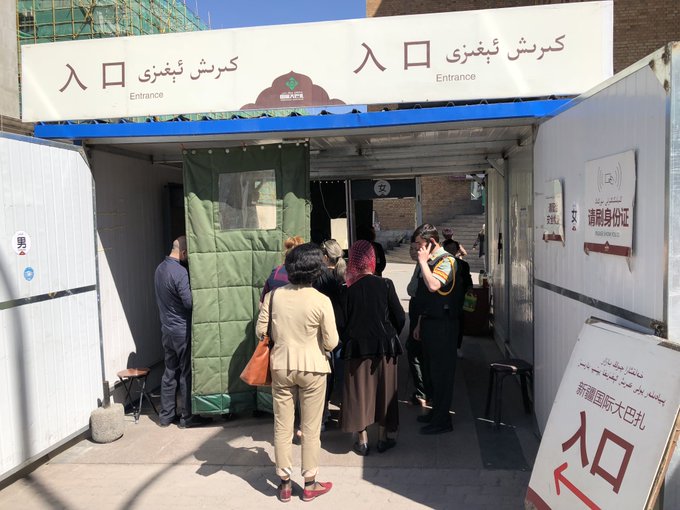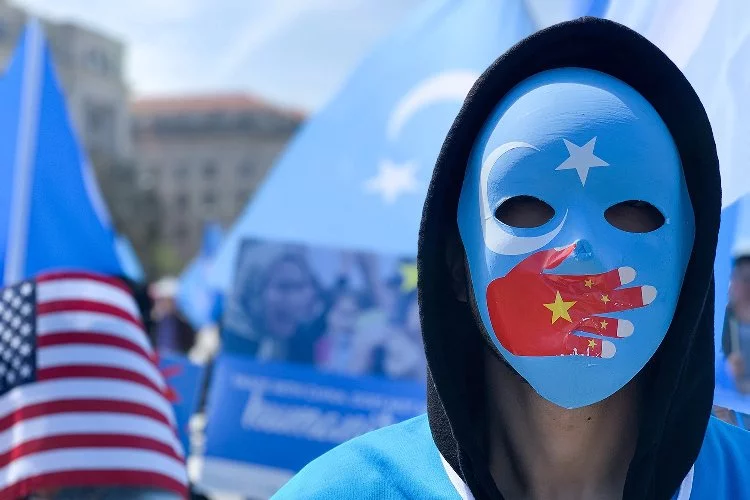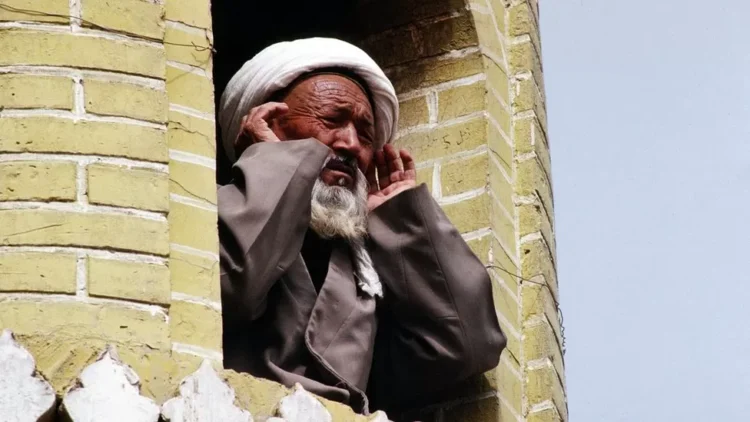How a Chinese region that accounts for just 1.5% of the population became one of the most intrusive police states in the world
- China’s Xinjiang region is home to 1.5% of the country’s population, but accounted for one in five arrests in 2017.
- This didn’t include the hundreds of thousands of people, possibly as many as 1 million, who are being held in extrajudicial political “re-education camps” designed to indoctrinate ethnic minorities and force them to reject their religious beliefs.
- Xinjiang residents and, in particular ethnic Uyghurs, are banned from many religious acts and are monitored by authorities living in their homes, as well as surveillance apps, voice printing, and facial recognition cameras. Residents are also banned from entering certain stores and must swipe their ID cards first, which describes them as “safe,” “normal,” or “unsafe.”
- Authorities use the fear of family being put in re-education camps to control and silence Xinjiang residents and students while abroad, and many are detained as soon as they return.
- Some experts fear the camps, which have received little global attention, could soon become the site of mass murders.
The vast Xinjiang region in northwestern China is home to just 1.5% of the country’s entire 1.3 billion residents. But in 2017, one in five arrests in China occurred there.
In total, out of Xinjiang’s 22 million residents, 227,000 people were arrested — a 731% increase from 2016, according to data released last week from the advocacy group Chinese Human Rights Defenders.
But what may be most concerning of all, is that these numbers don’t include the hundreds of thousands, possibly 1 million people, who have been rounded up and thrown into political “re-education camps” in the last 18 months. None of these people entered the official court system, most never committed an actual crime, and many have never been heard from again.
“This strong rise in 2017 [arrests] is consistent with all the other securitization measures, including massive police recruitment, deployment of sophisticated technologies, installation of checkpoints everywhere, etc. Re-education detainment figures are certainly on top of these numbers,” Adrian Zenz, a social researcher at the European School of Culture and Theology who used job ads and construction bids to estimate the number of detainees, told Business Insider. “It shows the scale of the security state in Xinjiang at these different levels.”
A ethnic Uyghur woman sweeps outside her house on July 1, 2017 in the old town of Kashgar, in the far western Xinjiang province, China. Kevin Frayer/Getty Images
Authorities have been targeting Xinjiang residents and, in particular, the local Muslim Uighur minority, under the guise of fighting terrorism. But experts consider the recent crackdown an attempt to suppress expressions of religious identity that the Chinese Communist Party (CCP) fears threatens the very stability of the Party.
To prevent this, local authorities have built and expanded facilities across Xinjiang where residents, mostly Uighurs, are forcibly detained and indoctrinated with the will of the CCP.
They are bullied and threatened into abandoning their Muslim beliefs and instead study Chinese history, write personal reflections, and sing songs like “Without the Communist Party, there is no New China.” Many are isolated, beaten, tortured, and are unable to go home.
Sayragul Sauytbay, an ethnic Kazakh Chinese national who is currently on trial for illegally entering Kazakhstan to rejoin her family and is believed to have been arrested at the request of China, recently testified about the scope of one camp she worked at that held 2,500 ethnic Kazakhs.
Residents can’t even shop where they want
Biometric data, as well as information on each resident’s ethnicity and religious practices, is not only collected by authorities but tied to each person’s ID card.
For Uighurs, these cards are checked when they’re doing everything from traveling to filling up petrol. Regular checkpoints on the roads require Uighurs to get out of their cars, place their card in a reader, and walk through body scanners. It’s also been reported that individuals who buy knives require a QR code of their ID information to be etched onto the blade.
An activist who goes by the pseudonym Azat Erkin, because he still has family in Xinjiang, recently described in a Facebook post a meeting he had in Kazakhstan with an ethnic Han resident from Xinjiang. The man, who was given the name Wang Hao to protect his identity, said his wife worked in one of the political camps and went on to explain what life is currently like in the region.
“Citizen IDs are divided into three kinds now in Xinjiang – white, yellow, and red. Your moving about is relatively free if yours is categorized as white. If it’s yellow, you can go from the villages to the towns, but only with the approval of the local commune authorities (whose office is web-linked to national security). If it’s red, you can only stay in the village, and don’t have permission to go anywhere,” Wang said, per an English translation.
“Even if you have to get an emergency operation done they won’t let you leave the village, with you left at home to wait for death. Most of the people who have come out of education centers are marked as red,” he said.
While Business Insider wasn’t able to independently verify these claims, we did speak with Erkin who repeated the information. It also fits into what we already know, Timothy Grose, a China expert at the Rose-Hulman Institute of Technology, told Business Insider.
“I cannot confirm a literal color-coding of citizens’ identification cards , but I have heard several corroborating reports that describe labeling citizens as “safe,” “normal,” and “unsafe” (via the ID system) based on metrics such as faith, age, faith, religious practice, foreign contacts, and experience abroad. These categories appear to overlap with the color coding described in the Facebook post,” Grose said.
“From my understanding, the identification cards — swiped at the virtually hundreds of checkpoints standing in intersections, bookstores, shopping malls, etc. — are flagged electronically. Therefore, when an individual swipes his/her ID card, it pulls up vital information about that person, including his/her “risk” to society,” Grose said.
Wang also described how residents’ movement is severely restricted by access cards that, once swiped, not only display personal information but also include geo-restrictions, meaning individuals are banned from entering certain shops, restaurants, and markets.
“Unless you have it on you, you can’t go in stores, and even then you can only go in designated ones. For example, my access card only lets me shop at the stores downstairs and the shopping mall(s). I can’t go into any other stores in the commune, or buy anything there,” he said referring to a residential district. “If I tried, it would automatically alert the police. So you have to pay whatever the price is at the designated stores, with no choice to shop elsewhere.”
Forgetting to carry ID cards is also a violation of local rules.
There is no escape
While most Xinjiang residents are unable to leave — in 2016, residents’ passports were recalled and it was announced that locals would require approval to travel — those who do manage to go overseas find they’re still at the mercy of police back home.
Business Insider is aware of instances where police have reportedly asked residents abroad to send pictures of themselves holding newspapers to confirm residents are where they say they are. One Xinjiang resident in DC said they were told to take a picture of themselves holding a newspaper in front of the White House.
But as unusual as that is, it’s relatively mundane compared to some lengths police go to.
A young Chinese pro footballer who traveled abroad to train and play matches as part of his job has reportedly been held in a re-education camp for months for “visiting foreign countries.” Last year, 200 Uyghur students were arrested in raids in restaurants, shops, and accommodations across Egypt, thought to be under orders from Chinese police, and two men who voluntarily travelled home are believed to have died in custody.
And one Uyghur student who was studying in the US was held in a detention center without charge for 17 days when he went back to China over a semester break.
Business Insider is also aware of a Chinese student studying in Australia who was reportedly called back to Xinjiang by secret police after posting criticisms on social media. She reportedly said she was told about being sent to political re-education. She has not been heard from since returning to Xinjiang over the winter break.
It’s not an unusual outcome for those put in re-education camps, but many are there not because of their own actions but are used as leverage to silence outspoken exiles and expats abroad.
The poet Hamut spoke last week at the State Department’s Ministerial to Advance Religious Freedom about how his two brothers-in-law were detained in “retribution” once he and his family arrived in the US last August.
“In spite of this, I still shared what I had seen with the international media. This has led to the detention of one of my brothers. Like all other Uighurs living in exile, I cannot contact my relatives at home. I don’t know whether they’re alive or not,” Hamut said.
Gulchehra Hoja, a Radio Free Asia journalist who now lives in the US and writes about the Xinjiang region, testified last week to the Congressional-Executive Commission on China that more than 20 of her relatives “remain missing, certainly held in what’s called political reeducation camps run by the Chinese government.”
Her brother was the first to be detained in September last year while driving his mother to a doctor’s appointment, and has not been seen since. In February, her aunts, cousins, and their children all disappeared in one day. Her parents also went missing in February and were released a month later.
“Authorities have questioned my parents about me. Where I am, and my work for an organization they claim is anti-China. Many of my colleagues at the RFA share the same situation, their families are also missing, detained and jailed, after receiving threats about their work at RFA,” Hoja told US senators.
Family members of five Radio Free Asia journalists, including two US citizens, have recently been detained. Detaining relatives, or just threatening to do so, is an incredibly common and effective way of controlling and silencing Chinese individuals while they are abroad.
“When I heard my brother was detained, I [initially] chose not to speak up because my mother asked me, ‘Please I already lost you, I don’t want to lose my son too.’ My family haven’t been able to be reunited in 17 years,” Hoja said. “We don’t want to put them in further danger because of our acts or any word against China.”
“I believe any Uyghur has a friend or family member in the camps right now,” Hoja said.
Foreign residents aren’t just forced to stay quiet. According to BuzzFeed News, the threat of these camps is being used to force Uighurs to spy for China. The government reportedly uses these individuals to gather information about Uighurs overseas, disrupt these communities, and intimidate others to not speak out against China.
Too big to hide
Satellite images clearly show the immense size, security measures and speed with which detention centers have been built over the last year.
Shawn Zhang, a law student in Canada whose family in China have also been contacted by police over his critical social media posts, has been using satellite imagery to identify potential camps throughout Xinjiang. The largest building Zhang has found is in Dabancheng, which he estimates holds 8,000 to 10,000 people — around 20% of this one area’s population.
With so many parents disappearing into camps, orphanages are overflowing. In 2017, the city of Kashgar built 18 new orphanages.
Despite diplomatic and press efforts to raise the issue with Chinese authorities, China’s Foreign Ministry jas said it “had not heard” of the situation in Xinjiang and state-run media has largely avoided the subject.
But that may be beginning to change.
For what appears to be one of the first times, state media last week reported on how “extremists” are having their “religious thoughts” reformed while in official prisons.
And earlier in the month, the tabloid-like Global Times described how authorities “relocated 461,000 poverty-ridden residents” from Xinjiang to other areas in the first three months of the year. According to Zenz, these numbers are consistent with one program aimed at training “rural surplus laborers.”
“My research also shows that many counties launched recruitment notices for “training” facilities in early summer 2017, and that many of them likely function on a scale where the one extreme is political re-education in highly secured detainment facilities, and the other is compulsory vocational training with some re-education contents.
The purpose of this Global Times article seems to be to justify the fact that many residents are being relocated into training facilities and then relocated for employment,” Zenz told Business Insider.
An entire population could disappear
Xinjiang is a “textbook” case for Magnitsky sanctions, Rep. Christopher Smith, co-chairman of the Congressional-Executive Commission on China, said last week. In April, Smith and Rubio sent a letter to the US Ambassador in Beijing requesting the embassy begin researching specific individuals who could be targeted for possible human rights violations under the Global Magnitsky Act.
“This is what these people do with the power they have now. Imagine what they will do when that power grows militarily, economically, and geopolitically. Because if this is how you treat your own people, how do you expect them to treat some other part of the world,” Rubio said at the commission’s hearing on Xinjiang last week.
“And the international organizations that stand by and say nothing, why? Because China went into somebody’s country and built a road or a bridge, or maybe bribed them and gave them a billion dollars to be quiet and go along. This is sick,” he added.
While such rhetoric can seem exaggerated in the world of international diplomacy, it may not to be. The foreign minister for Vanuatu, which has accepted millions of dollars in loans from China and is unlikely to be able to afford repayments, told Australia’s “60 Minutes” earlier this year, in no uncertain terms, that China expects support at the UN in exchange for its cash.
And with China’s massive Belt and Road Initiative seeing an influx of cash and infrastructure in up to 70 countries, the consequences for human rights could be devastating.
Already, estimates are that 5-to-10% of the Uighur population have disappeared into political camps.
But what concerns Rian Thum, a historian at Loyola University, is the possibility of history repeating itself as the system becomes too big to prevent improvisation at the lower levels.
“The most frightening purpose is the one that hasn’t occurred yet: while torture and deaths in the camps seem to be happening at pretty low levels, that can change, and in fact I don’t think we can rule out the possibility of mass murder,” he told the commission last week.
Thum is not alone in his beliefs. Hamut, who still has been unable to contact his family, agrees.
“I believe the Chinese government is likely to carry out mass kills of Uighurs in concentration, like the Nazis did to Jewish people,” he said.
Kaynakça
- https://www.businessinsider.com/xianjiang-province-china-police-state-surveillance-2018-7





